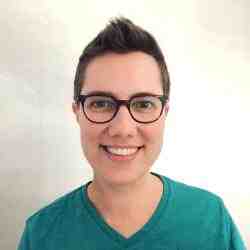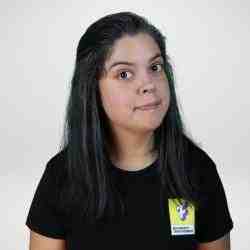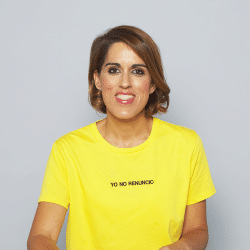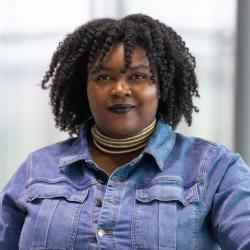Introduction
Poor children suffering from chronic illnesses in Philippine public hospitals experience extreme stress and pain. Families and hospital staff also suffer from the physical demands of caring and the emotional strain of treating children with serious, often terminal, conditions. Maria Fatima “Girlie” Lorenzo is transforming Philippine public hospitals by creating a national system for psychosocial support for indigent patients, their families, and caregivers.
The New Idea
For terminally-ill children and their poor families, hospitalization can be extremely stressful between painful treatments and unmanageable medical bills. Psychosocial support addresses these emotional and social problems before they affect the child’s chances of recovery and the family’s ability to continue treatment. Child Life Specialists are equipped to deliver this support as trained healthcare professionals with expertise in child development and family systems.
In the Philippines, Fatima recognized the lack of psychosocial support in the healthcare system. She is creating a space and added value for the previously underdeveloped role of Child Life Specialists.
Fatima’s vision is to change the way hospitals think about psychological and social support: from a supplemental service into an integrated part of the healthcare field in the Philippines. The government and medical staff have viewed psychosocial support as an extra service taking place in parallel to medical care, but not really part of the formal treatment of a case. The practitioners—Child Life experts and their helpers—were seen as little more than outsiders playing minor, supporting roles outside the system. Fatima’s Kythe Child Life Program, on the other hand, is fully aligned with the hospital’s operations. Fatima is adamant that Kythe Child Life Coordinators become integrated into the ward and serve as members of the hospital staff that abide by the same standards and policies as regular employees and are respected as part of the ecosystem.
Kythe Child Life Specialists provide indigent pediatric patients and their families counseling and emotional support, from the point of disclosure to the very end of the child’s illness. Kythe prepares patients and families for medical procedures and also educates them about the illness. In order to give children an outlet from the depressing hospital setting, Kythe offers kids a safe space to play filled with toys and books, equipped with staff to initiate therapeutic play. In addition to the psychosocial support it offers, Kythe also helps fund certain medical treatments for indigent patients through a deep understanding of patients’ individual needs.
The benefits of psychosocial support go beyond the patients and their families. Fatima realized that this type of support was also crucial for the well-being of medical staff. Fatima and her team help medical staff and hospital leaders to process their emotions and recognize their needs as well as their patients’ needs. Kythe teaches doctors how to relate to their patients and how to manage difficult situations like disclosing bad news to a family. These are crucial skills which are surprisingly absent from medical education.
The mobilization of student-volunteer groups has been crucial to Kythe’s development. Through partnerships with universities such as Ateneo de Manila, Kythe has given students a life-changing experience through volunteer work with Kythe and its beneficiaries. As a result, Kythe has sustained long-standing support from not only their student volunteers, but alumni as well. When alumni move on in their professional careers, they champion Kythe and connect the companies they work for to sponsor Kythe’s initiatives. This serves as a sustainable approach that get stakeholders rooted in the cause.
To date, Kythe has reached over 8,000 patients and their families nationwide. As President of the Philippine Alliance of Patient Organizations (PAPO), Fatima is now gathering support from patient advocacy groups. In partnership with the Union of Local Authorities of the Philippines (ULAP), Fatima has been participating in road shows for PhilHealth, the national health insurance provider, to support disabled patients and give them access to healthcare. Through PAPO and her allies in ULAP, Fatima plans to convince PhilHealth to integrate psychosocial support in the national system.
The Problem
Public hospitals lack the resources and manpower to meet the needs of indigent patients. For example, it is common for parents to buy their own medical supplies for their children such as needles and prescribed medicine; there are not enough bathroom facilities for the amount of patients that the hospital serves; beds are typically shared by two patients; and hospitals are understaffed with doctors seeing as many as 60-70 patients per day.
Pediatric patients suffering from illnesses like cancer can be traumatized by painful medical treatments and insensitive behavior of hospital staff. There is an absence of support for both the children and their families to cope with these anxieties.
Parents remain uninformed about their children’s illnesses because there is a lack of hospital personnel to thoroughly explain the medical conditions. Therefore, many parents continue to attribute their children’s sicknesses to superstitious beliefs. Parents also commonly misunderstand the doctor’s recommendations in medical terminology, which results in non-compliance of medical procedures.
Doctors experiencing burnout also need psychosocial support. Many doctors feel a sense of guilt and failure when they cannot cure their patient’s sickness. They do not have the means to emotionally process their experiences, as they struggle to meet the basic needs of patients in a volatile hospital environment.
Most government hospitals are resistant to change. Due to the broken system and poor conditions of these hospitals, the staff does not recognize psychosocial support as a powerful tool that increases patient survival. For some, the unfortunate reality is that the faster patients die, the more beds become open and available for newer patients. Typically, doctors see the integration of psychosocial support as more of a burden than a benefit, as it would require special time and resources to implement.
The field of psychosocial support is underdeveloped in the Philippines. Nationally, the government has not yet recognized the need for psychosocial support in public hospitals. Due to a lack of local evidence-based research, doctors are commonly unaware of the benefits of psychosocial support or do not make it one of their priorities. In many hospitals, doctors view Child Life Specialists merely as support staff that bring “play time” and entertainment to pediatric patients.
The Strategy
Fatima takes a holistic approach in integrating Kythe’s psychosocial support programs in hospitals. At first, Fatima used to engage hospital partners through a top-down approach by working closely with the hospital’s management. However, she quickly realized that by implementing the Kythe program this way, they would not be able meet the direct needs of the hospital staff. Today, Fatima applies a bottom-up approach by asking the social workers, nurses, and pediatricians directly about their needs and tailors the program accordingly. This type of approach gives hospital partners a sense of ownership in the integration of Kythe. Moreover, Kythe mobilizes Child Life Coordinators in the hospitals as change agents that are working on the ground, side-by-side with hospital staff. Because of this, Kythe Child Life Coordinators are not seen as outsiders, but as fellow hospital workers that offer resources, skills, and support that would not normally be available to public hospitals. These services include assistance for patients during medical procedures, resource mobilization, therapy and emotional support for patients, families and medical staff.
Fatima also recognized Kythe’s role as a bridge to link the medical staff and their patients. Fatima and her team conduct Passion for Caring seminars to empower and reenergize medical staff as able hospital leaders. Through the seminars, Fatima provides a safe environment to voice their concerns and also shares insights on how to communicate in a more effective and positive manner during patient interactions. For example, the seminar offers basic lessons on how to properly explain medical procedures to pediatric patients, as opposed to the usual practice of telling patients to simply “stab the child with the needle.” Sessions like these on cultivating and improving bedside manner along with other topics have been well received by medical staff.
Kythe started out as a student-led volunteer network that sought to bring play to indigent pediatric cancer patients. Since then, it has transformed into a dynamic vehicle that is driving change within institutions. Through the holistic engagement of volunteers, private donors, and hospital staff, Fatima and her team make sure that Kythe’s advocacy is deeply rooted in the lives of its supporters.
Fatima understood that exposure to dying children in public hospitals could have an immense impact on young people as it had in her own life when she was first exposed to these realities. She recognized that by institutionalizing Kythe campus-based student organizations, young people entering the medical field would gain a deep understanding of Kythe and champion its advocacy even as they moved into their respective careers in health.
Kythe enables volunteers to interact with patients through activities such as art therapy, integrated readings, “celebrate life” parties, and summer camps. As a result of an active push for volunteerism, Kythe student organizations not only serve as a consistent source of volunteers for Kythe’s programs, but also a powerful catalyst to spreading the importance of psychosocial support to corporations and even the medical profession, as a steady pool of volunteers eventually become medical doctors.
Dynamic volunteerism is also a strong force to keep corporate partners. In addition to engaging activities at the hospitals, Fatima and her team draw supporters in through creative approaches. For example, they offer corporate partners simple and transparent donor packages such as the Adopt-A-Hospital program, which offers donors one to three-year commitments. Kythe also encourages volunteer tourism enabling supporters to participate in outreach in sites across the Philippines. Fatima and her team maintain a rapport with donors by being engaged in their corporate partners’ CSR projects and giving them constant updates through comprehensive newsletters. As these various approaches demonstrate, Fatima has developed a sustainable model to ensure that the movement of Kythe continues to grow through the strategic seeds that are planted and nurtured.
Currently, Fatima is working to bring the value of psychosocial support to the national level. As President of PAPO (Philippine Alliance of Patience Organizations), Fatima is uniting various patient advocacy groups as a more powerful lobbying front. Through her strong ties with ULAP (Union of Local Authorities of the Philippines), she is beginning to engage mayors and councilors in local government units (LGUs). She seeks to convince PhilHealth to integrate psychosocial support in the national system. Over the past year, Kythe has been conducting local evidence-based research to demonstrate the benefits of psychosocial support and will be presenting the results within the next few months. Fatima’s hope is that through these initiatives, the government will address the need for a law that mandates comprehensive psychosocial programs in public hospitals for both adults and children.
The Person
As the youngest of four, Fatima saw herself as the mediator between her siblings. In school, she was popular and outgoing. She was also active in her parish council. Though she was the youngest member of this group, Fatima was not afraid to speak her mind. She noticed that the inside of the church was overcrowded with statues and felt that this was distracting for parishioners who came to the church to worship and meditate. Fatima vocalized her concern to the older council members who were extremely resistant to change. Eventually, due to the leadership and diplomacy she demonstrated as a young adult, she was able to successfully reform the policy of her parish. These formative moments in Fatima’s adolescence proved to have shaped her into the unassuming, amiable, and diplomatic leader she is today.
Fatima started Kythe while she was in graduate school. Initially, the goal for Kythe was simple: provide therapeutic play. Every week, Fatima and her group of student volunteers would play with the kids. However, an encounter with Paul – a child in the ward who was fighting cancer – made Fatima realize that she must go beyond play and support the full range of these children’s needs. Fatima became close to Paul and ended up raising money for his chemotherapy treatment. She was able to successfully raise PHP 60,000 (~1400 USD) at her birthday party, which she celebrated in honor of Paul. He was treated for his tumor and it subsided, but a few weeks later Fatima received news that Paul had passed away. This was Fatima’s first encounter with death. Even as she was dealing with her own grief over Paul’s death and confronting the emotional toll that this kind of work took on her, Fatima made a vow that she would continue to help children like Paul.
By the year 2000, Kythe was active in a second hospital, but the partnership was informal. Fatima conducted rounds at the hospital, but she felt that the staff were just tolerating her initiatives and considered her as merely “the play lady.” She knew that in order to gain respect in hospitals and among medical professionals, she needed credentials for her profession. That year, Fatima took her Child Life internship at the University of California San Francisco hospital. After taking an exam in 2001 with the Child Life Council, she became one of the first Certified Child Life Specialists in the country. The certification not only equipped Fatima with the tools to understand hospital needs on a higher level but it was also a strategic move. Fatima’s certification as a Child Life Specialist established her as a professional within the public hospitals.
It was during this time that Fatima began to see the need to change the system in public hospitals. In order to transform the field of psychosocial support from a supplemental service to an integral part of patient care, Fatima understood that she must not only address the needs of the children but tackle the challenges of the institutions as well.




